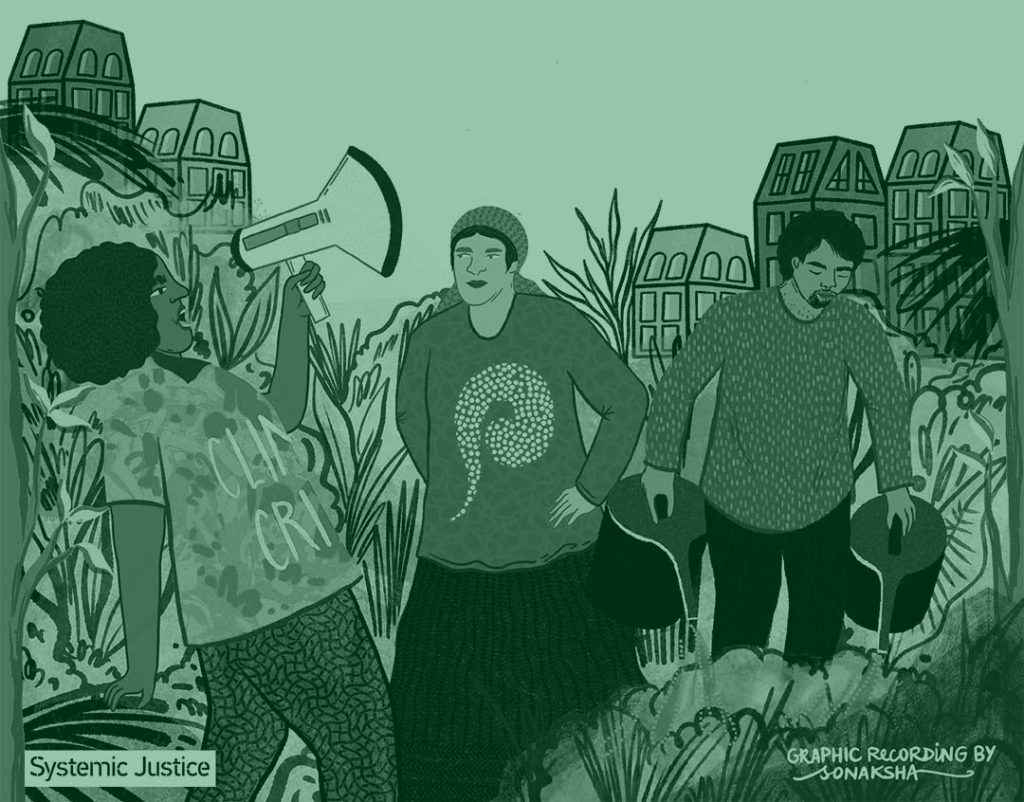Guest post by Jada Lauren Kennedy, climate justice and human rights activist. Jada participated in Systemic Justice’s roundtable on climate justice.
The feeling of taking my life into my own hands, taking my future into my own hands, reclaiming my voice along the way, and meeting incredible people from around the world. I feel like my life is becoming more of a foundation to build on, to build relationships with people who I respect, value, and admire. It creates spaces like the Systemic Justice Roundtables to interconnect.
It’s like I finally can breathe. But at the same time when I breathe, pollution hits my lungs.
From the minute I sit down, I have the urge to stand up. The minute I’m silent, I feel like there is so much left unsaid. From the minute I close my eyes, global leaders should open theirs.

When taking part in the first Systemic Justice Roundtable, I had doubts about the outcomes that might follow. It’s a new organisation gathering people from different countries, with every single person bringing up issues that matter to them, speaking out of life experience or based on knowledge on certain issues. When getting started, everyone was keen to create a safe and open-minded space, and over time the goal became clear. All our different perspectives brought together in this way made us interconnect. It seemed like we were a sample of the bigger picture of what intersectionality really means, when combining all our experiences, ways of thinking and knowledge. Active listening and participation created a dynamic space with statements about race, gender, Black liberation, and movement building reaching far beneath the surface.
I shared a statement during one of the sessions:
The word “radical” is seen as a bad word in western society. It is seen as “too much”. When western society says something is “radical”, to me this is a person speaking out of privilege. That they don’t need to act and fight back drastically to issues that don’t occur to them.
For example, I was sitting around a table with friends and activists, when one of my friends, an indigenous person from Mexico abruptly left the table, after hearing news that her government once again broke into her home and destroyed her personal belongings, as a warning for speaking out and taking action in Europe. When you see this, you rethink your privilege and democratic right. Her family needed to flee their home. She said something that really stuck with me;
“When even in democratic countries where people have the right to speak up and take action, while choosing not to, or appearing to be too scared to take up their privilege, and democratic right, that makes me angry.”
This stunned me, as I felt it was an accurate portrayal for many living in democratic countries today. When everyone is too scared to be “radical” and to speak out even louder, to what extent are we even a democratic country? To what extent do we even have freedom of speech?
The Systemic Justice Roundtable made me unfold thoughts like this, when discussing in breakout rooms, countering racial, social, and economic injustices from various angles. It was interesting to see how the discussion progressed quickly from introducing ourselves to writing down opportunities for action and change. Getting a variety of breaks, whether dancing or not, and being able to step away when needed, to regenerate my energy as certain topics like (environmental) racism arose, really helped me build trust into our created space.
Around the world, as negotiations take place and agreements are signed that contradict the very existence of human rights and our planet’s health, it becomes crucial to unite in spaces like the one Systemic Justice created.
The more you inform yourself, the harder it becomes to unsee the harsh reality. But the people I’ve met in recent years, who feel the same rage and emotions that I do, who have been fighting by my side on the frontlines across different continents. They speak with courage, from life experiences. They give me hope. After our discussions at the Systemic Justice Roundtable, I can’t wait to see how all our ideas interconnect and unfold.
Let’s get busy. Let’s get loud. Let’s stay present.
The author, Jada L. Kennedy, is a climate justice and human rights activist. Jada participated in Systemic Justice’s roundtable on climate justice.
